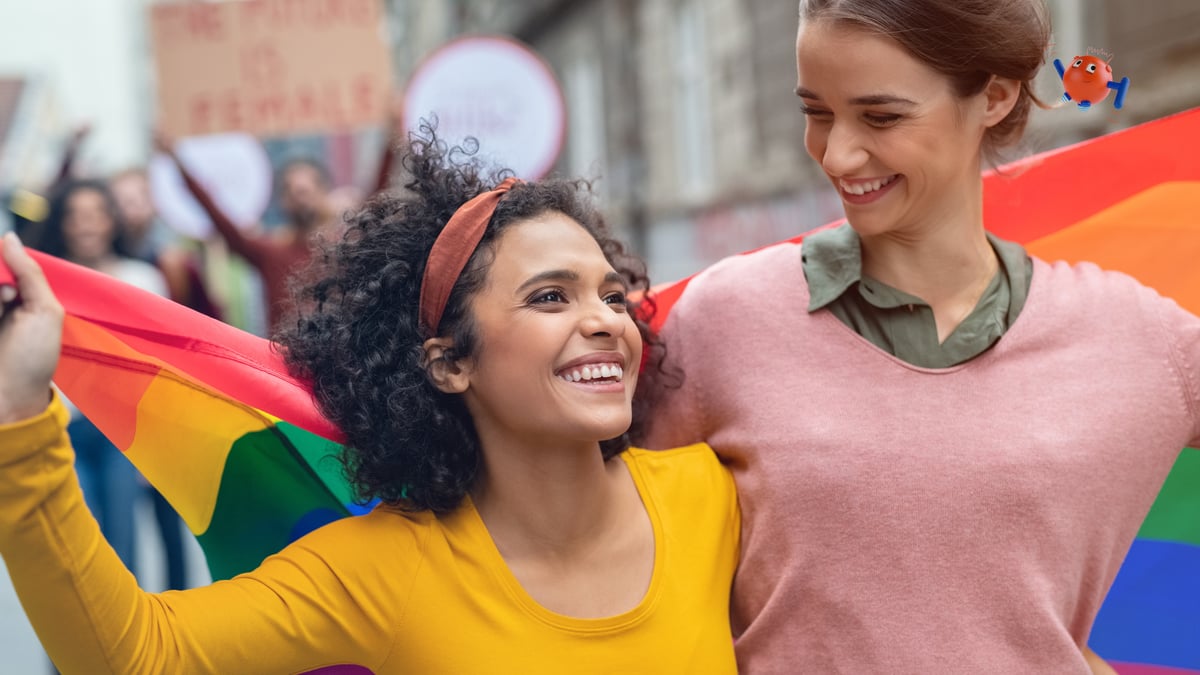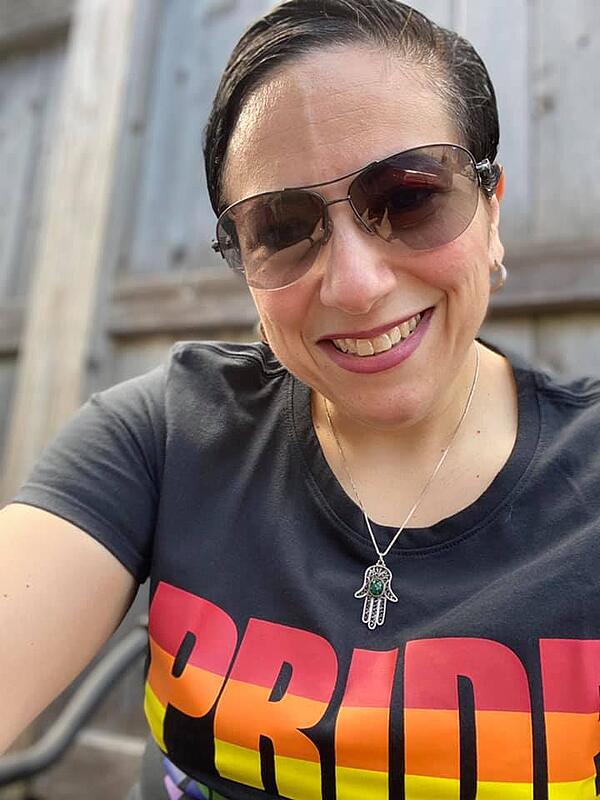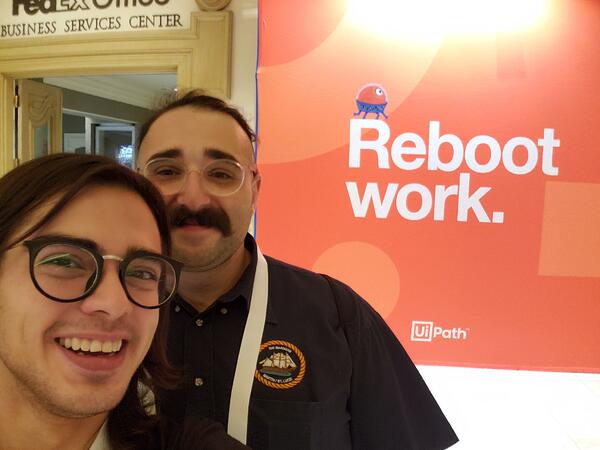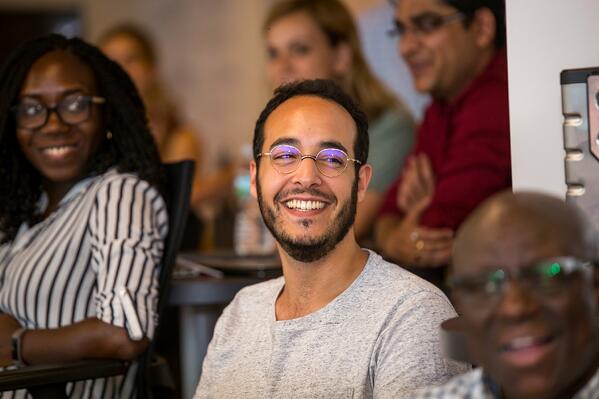Pride Month Spotlight: UiPathers Celebrate What Pride Means to Their Community
Pride Month Spotlight: UiPathers Celebrate What Pride Means to Their Community

June is Pride Month, a month when LGBTQ+ communities around the world come together and celebrate the freedom to be themselves. Events including Pride Parades, marches, parties, concerts, workshops and symposiums used to draw millions of attendees, but the COVID-19 context changed it a bit. I’ve had the chance to talk with three UiPathers who are part of the LGBTQ+ community and covered topics like what is the significance of Pride Month, how did they celebrate it during the COVID-19 pandemic, and what does being an ally mean to them. It was a pleasure to speak with Toni Iafrate, VP of Global Communications, Cyril Kuhns, Premium Support Lead for the Americas, and Yann de Sousa, Global Benefits Manager.
What does Pride Month mean for you?
Toni: Pride is something that I feel every day. And every single day my family is showing the world that nothing is stronger than love. And for those that don’t understand that we love them harder. Pride is visibility. Because of those that have fought and rallied before me, we can continue to push for full freedom, liberation, and equity in all forms for our community.

Cyril: Pride is about celebrating who we are, the freedom to be who we are, and recognizing the history of how we came to have that freedom. For example, the first Pride celebration was the Stonewall Riot, in which the predominantly Black gay and transgender communities of New York City were protesting anti-crossdressing laws which unfairly discriminated against them by criminalizing their lifestyle. I think things like this are critical to remember as folks continue to protest for their rights today.
Yann: My answer would have different layers. A lot of people, myself included, see this month as a celebration of our history, the progress we’ve made and a time to remember those who fought for our rights in the past. It’s a time to gather with my friends, with people from the community, with people that I consider as allies. Then comes the second layer. The second layer is a moment also to remember that the freedom I enjoy is not universal. There’s still a lot of countries, places or social units where being gay is not even allowed, where it is even a penalized crime, where you fear for your life for being who you are. And the last layer is education. This is an important component. Pride month is a time when public institutions and private companies should come together to strengthen awareness, and their education efforts for the year to come.
How are you celebrating Pride this year with all the COVID restrictions?
Toni: There’s been great virtual Pride events, including virtual Pride Flag raising ceremonies and Tea Dances. Tea Dances became a very important part of the LGBTQ+ culture during the '50s and '60s when gay and lesbian couples were not allowed to dance together, or in some cases, they were not allowed to drink alcohol together. They embraced a very classy Victorian tea party. Tea Dance parties continue to be popular to this day. It’s been fabulous to participate in those over Zoom and feel a sense of togetherness globally.
Perhaps more importantly, we’ve been celebrating the US Supreme Court’s landmark ruling that LGBTQ+ workers are protected from job discrimination under federal law. Roughly 4 million LGBTQ+ employees work in 27 states without such anti-discrimination laws. This is a major victory for the LGBTQ+ community and advocates of gay rights. While our work is never done to ensure everyone has an equal chance to succeed, it is certainly a monumental step in the right direction!
Cyril: I’ve never been a huge fan of the big party with everybody getting dressed up. It’s not how I celebrate in general. This year I thought of celebrating by exercising ALL my rights, so I shot a gun for the first time.

Yann: Digital events are a big thing during these times. I’m also planning a physical meeting with some friends while respecting social distancing measures. We're going to gather and talk about different topics which often are outside our comfort zone. As we’re mostly gay men, we usually take the opportunity to discuss how we can use our privilege to bring more awareness of other LBGTQ+ groups and support their efforts.
What does being an ally mean for you?
Toni: An ally is someone who actively promotes and aspires to advance the culture of inclusion through intentional, positive, and conscious efforts that benefit people as a whole. Men can be allies to women. White women can be allies to people of color. Economically privileged people can be allies to those who are not. And so on.
In terms of how people can be allies, they can become sponsors. Being a sponsor is different from being a mentor. I believe calling out inappropriate behavior is one way to be a sponsor. People in privileged positions can call out unacceptable behavior. We can use more inclusive language, be more aware of gender terms and be mindful of language that embraces all people. For example, using the term partner instead of using gender terms like ‘girlfriend’ or ‘boyfriend’. I’ll never forget being at a holiday party with my partner and I had introduced her as my partner, and someone asked, ‘Is this your business partner?’ And I said: ‘No, this is my partner. Like my wife.’ My co-worker at the time felt very embarrassed and later apologized to me, but these are things we need to be aware of.
Here are some numbers to “motivate” people to become allies. Today, there are nearly 50% of LGBTQ+ people who are closeted at work. Fifty three percent of LGBTQ+ workers report hearing jokes about lesbian or gay people occasionally, and the reason they don’t report the comments is because they think nothing will be done about it. Or they think it will affect their relationship with their co-workers. It’s disheartening. We can and have to do better.
Remember, for some LGBTQ+ workers, living authentically at work remains an aspiration. Coming out at work is still a big deal – and no two experiences are alike. Having the support of allies makes an enormous difference.
Cyril: I think an important part of being an ally is listening without intent to reply. Just listen to the person, be present and try not to put any burden of proof on them, because that’s eye-witness testimony of an experience you cannot have as an ally. I think a good example of that at UiPath is a conversation I had with a Romanian colleague. We were discussing the attitude toward LGBTQ+ folks in Romania, and the person said something like ‘I don’t have a problem with a person being gay, but why do you have to tell people about it? Why do you want to talk about it so much?’ I told them that all I want is to connect with my colleagues the same way anyone else does, talking about our interests and our lives outside of work. Often colleagues don’t even realize how much of their girlfriend or boyfriend is in a story because they don’t have to think about it. I’ve been with my fiancé for almost 6 years now so it’s quite hard to tell a story about my life that doesn’t include him. The person genuinely never thought about it that way, and I think they might never have if they didn’t ask and then truly try to hear my response.
Yann: In my opinion, it takes three steps to become an ally. The first one is to educate yourself. Try not to go right away with a hundred questions to someone who's part of the minority you want to learn about. Go and educate yourself on your own or ask other allies! Do a little bit of research. If you don’t like to read, there are tons of videos to watch. If you don’t like videos, you can listen to some podcasts. There’s plenty of material out there, the work has been done. The second thing would be to not be afraid of getting uncomfortable. Or if you are, then to learn how to be okay with it. You're going to get uncomfortable. You never learn by being in your comfort zone. You're going to make mistakes. You're going to screw up. You’re also going to realize the depth of homophobia, your unconscious bias, mistakes you have done in the past. And that’s where you will actually be learning. The third step is to understand that being part of a majority, your voice as an ally is way stronger than ours altogether. Get ready to be active, be willing to bring awareness to people like you, raise them up to your new level. It doesn’t take a lot of time, but it takes a lot of energy. When you fight for a cause, which many people are not even aware of, you can end up feeling like an outcast, drained from your efforts. Then you're going to have a little bit of sense of what it really is to be in someone else’s shoes. That’s also where compassion and meaningful connections kick in.

How does it feel working at UiPath from a D&I perspective?
Toni: Until I joined UiPath, I really wasn’t out at work. My close co-workers knew, but otherwise, it was a secret. In some ways I was fearful, in other ways I felt it would become my whole identity. I think the fact that now I feel empowered says something about UiPath and our culture. That’s why I raised my hand and volunteered to do this piece. This really means something to me, and I don’t want to be close-mouthed anymore. I have more to lose then I have to gain by not being vocal.
I’ve been with my partner Jennifer for nearly 15 years. If I don’t bring my true self to work every day, I’m letting myself down. I would be doing the company a disservice. Finally, we also need to think about the different voices that we have, and we need to challenge each other. I was inspired by something Daniel said recently, we need to be comfortable being uncomfortable. We’re on a unique and challenging journey at UiPath and it takes a village of differences brought together in harmony to drive change.
Cyril: I think we always have room for progress when it comes to D&I at UiPath, but one recent step I’ve been happy to see us take is intentionally diversifying our pipeline by partnering with different recruiters who make that their mission. I would never suggest hiring someone who is underqualified simply because they check a demographics box. Rather, the goal should be to include enough diversity in our pipeline that we are able to find a candidate who is both the strongest for the role and a person of color, or a woman, or whatever identity is not well-represented in the company.
Our People Ops team is awesome about responding to feedback from the LGBTQ+ community and others within UiPath, too. For example, I am also non-binary and I use they/them pronouns. A huge step for me was the gender-neutral bathroom in the New York office. I was really touched when we announced this would be a feature of our global headquarters.
Yann: We started to have conversations organically, come together, have ideas on what to put in place, bring awareness and education. The company is picking up on it and is facilitating our efforts. This is kind of a new thing for me. At the beginning, my only sense of belonging with UiPath was by being an employee, or part of a department or a team. It was never about my entire being. Now I’m starting to feel like I can bring my whole self at work. And that gives me purpose. I think our goal should be that no matter the country you live in and the beliefs your surrounding has, you can still find a place to be who you are at UiPath. Without judgment, with even active support from the people you work with. Meaning that despite the homophobia, conscious or unconscious bias you may experience out there, you can find comfort in being your true self at work, the possibility to be just the way you are.
At UiPath, we value a range of diverse backgrounds experiences and ideas. We pride ourselves on our diversity and inclusive workplace that provides equal opportunities to all persons regardless of age, race, color, religion, sex, sexual orientation, gender identity and expression, national origin, disability, military and/or veteran status, or any other protected classes. And we learn every day.

Employer Branding Manager, UiPath
Get articles from automation experts in your inbox
SubscribeGet articles from automation experts in your inbox
Sign up today and we'll email you the newest articles every week.
Thank you for subscribing!
Thank you for subscribing! Each week, we'll send the best automation blog posts straight to your inbox.



